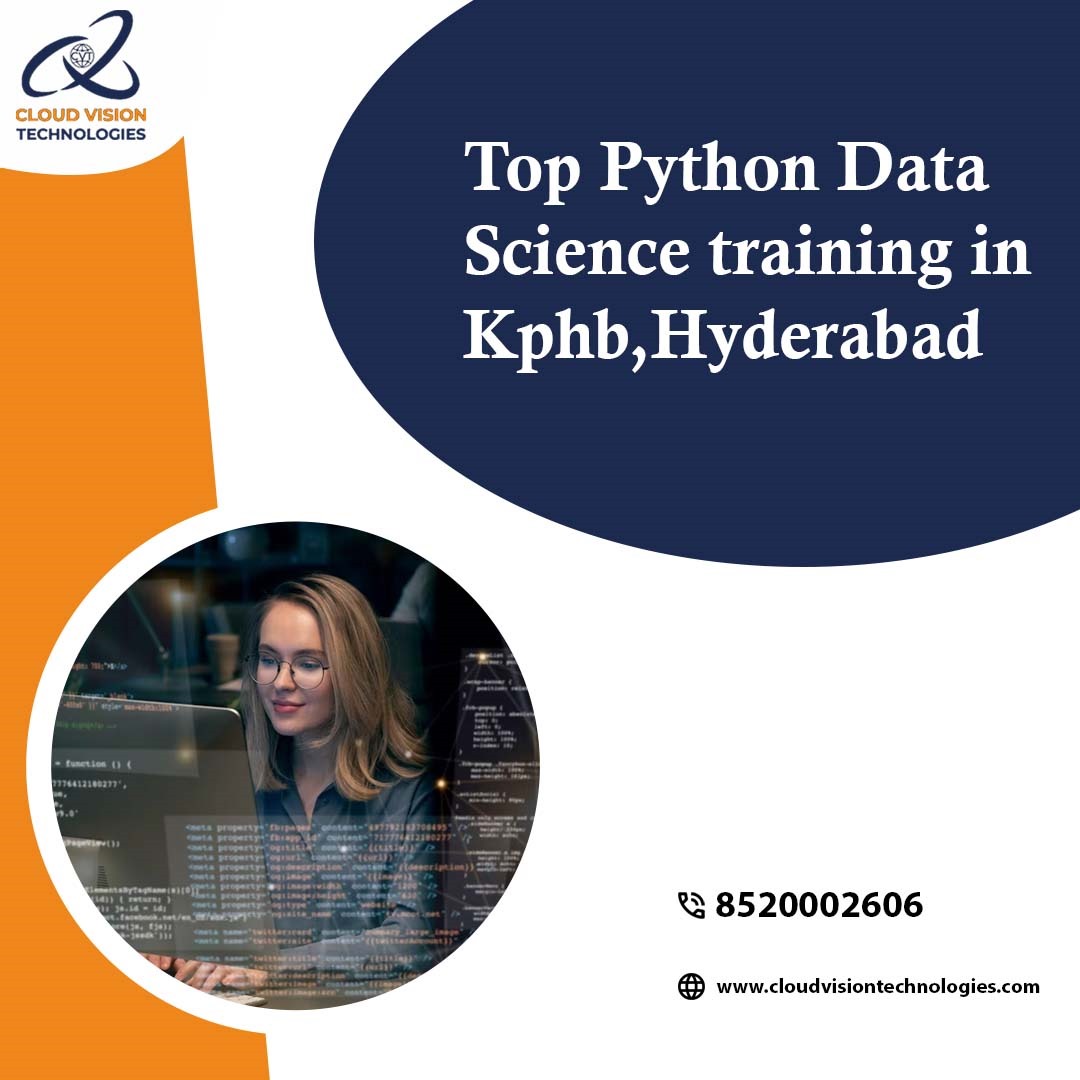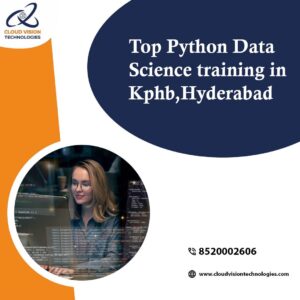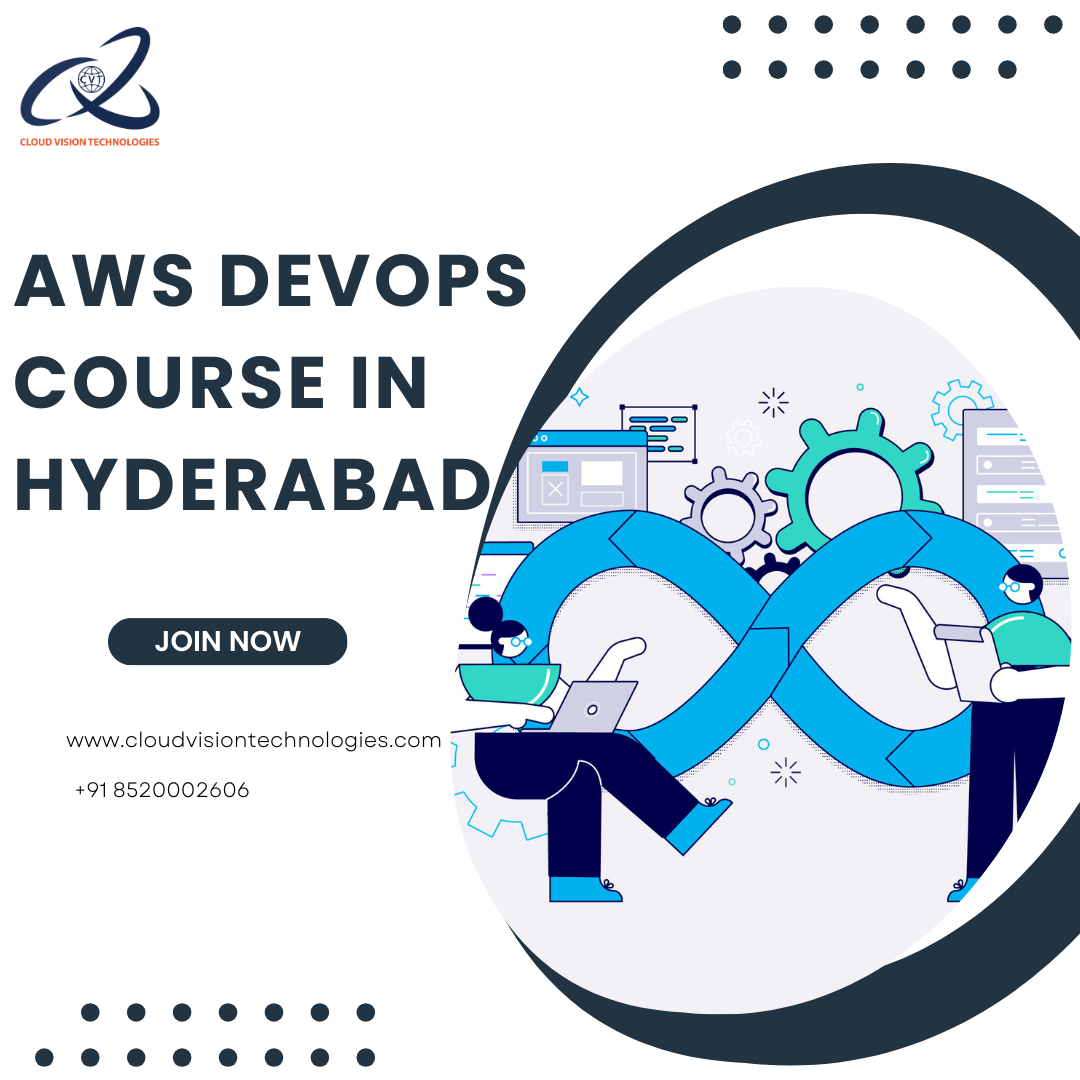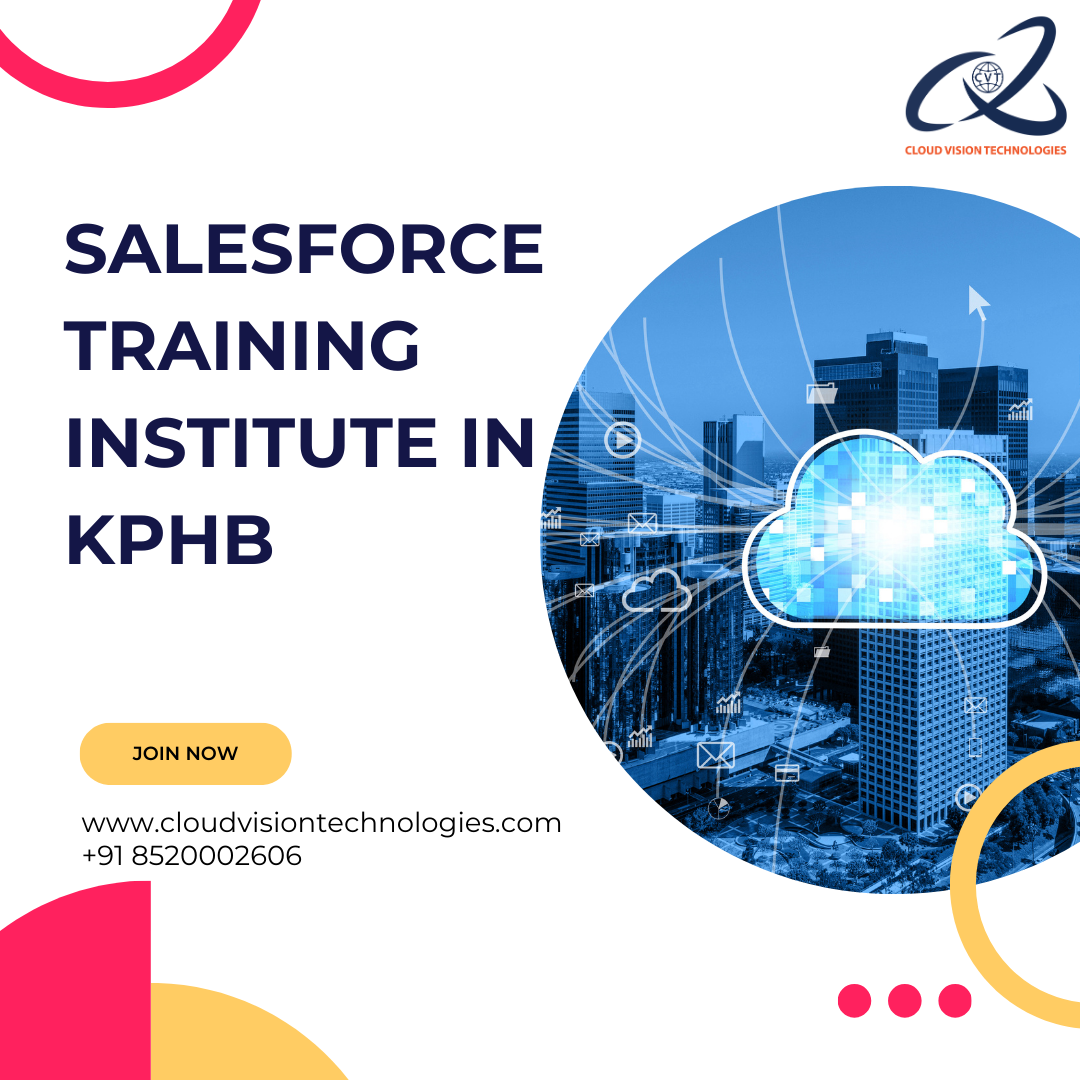
Top Python Data Science Training in KPHB, Hyderabad
Master Data Science with Python: Top Training in KPHB, Hyderabad by Cloud Vision Technologies
Introduction:
In the digital era, where data is considered the new oil, harnessing its potential is paramount. Python, with its versatile capabilities and rich ecosystem of libraries, has emerged as the go-to language for data science. To capitalize on this trend and equip aspiring data scientists with the requisite skills, Cloud Vision Technologies in KPHB, Hyderabad, offers top-notch Python Data Science training. This comprehensive course empowers learners with the tools and knowledge necessary to excel in the dynamic field of data science.
A Python Data Science course can encompass a vast array of topics, but generally, you’ll learn skills across three key areas: Data Manipulation & Analysis, Machine Learning & Modeling, and Additional Specialized Topics. Here’s a breakdown:
Data Manipulation & Analysis:
- Python Programming Fundamentals: Grasping core concepts like data types, variables, control flow, functions, and object-oriented programming.
- Data Wrangling with Pandas: Mastering data import, cleaning, exploration, and transformation using powerful libraries like Pandas.
- Numerical Computations with NumPy: Efficiently handling numerical data and array operations with NumPy.
- Data Visualization with Matplotlib & Seaborn: Creating compelling charts, graphs, and visuals to communicate insights effectively.
- SQL Essentials: Understanding Structured Query Language (SQL) for interacting with relational databases.
Machine Learning & Modeling:
- Supervised Learning: Exploring algorithms like linear regression, decision trees, random forests, and support vector machines for prediction and classification tasks.
- Unsupervised Learning: Discovering hidden patterns and structures in unlabeled data using techniques like clustering and dimensionality reduction.
- Deep Learning Introduction: Gaining basic understanding of neural networks, convolutional neural networks (CNNs), and recurrent neural networks (RNNs) for tasks like image recognition and natural language processing.
- Model Evaluation & Selection: Learning techniques to assess model performance and choose the best model for your specific problem.
- Additional Specialized Topics (Course-Specific):
- Big Data Handling: Working with large datasets using tools like Apache Spark.
- Cloud Computing Platforms: Leveraging cloud platforms like AWS and Azure for data science tasks.
- Web Scraping & Data Acquisition: Techniques for extracting data from the web.
- Domain-Specific Applications: Depending on the course focus, you might learn data science applications in fields like finance, healthcare, or marketing.

Why Python for Data Science?
Python has become the de facto language for data science due to several key factors:
Ease of Learning and Use: Python’s simple syntax and readability make it accessible for beginners while offering advanced features for seasoned professionals.
Extensive Libraries: Python boasts a plethora of libraries such as NumPy, Pandas, Matplotlib, and Scikit-learn, which facilitate data manipulation, analysis, and visualization.
Community Support: Python enjoys robust community support, with a vast repository of resources, forums, and online communities, making it easier for learners to troubleshoot problems and stay updated with the latest advancements.
Course Overview:
Cloud Vision Technologies‘ Python Data Science course in KPHB, Hyderabad, is designed to cater to both beginners and experienced professionals looking to upskill in data science. The curriculum is meticulously crafted to cover the following key areas:
Python Fundamentals:
The Python Fundamentals module serves as the cornerstone of the course, laying a strong foundation for participants regardless of their prior programming experience. Through interactive lectures and hands-on exercises, students gain a thorough understanding of Python’s syntax, data structures, and control flow mechanisms. Moreover, they delve into advanced topics such as object-oriented programming (OOP), decorators, and generators, which are essential for building scalable and maintainable data science applications.
In addition to theoretical concepts, this module emphasizes practical coding exercises to reinforce learning. Participants are encouraged to solve real-world problems using Python, honing their problem-solving skills and logical thinking abilities. By the end of this module, students not only become proficient Python programmers but also develop a mindset conducive to tackling complex data science challenges.
Data Manipulation with NumPy and Pandas:
NumPy and Pandas are indispensable tools for data manipulation and analysis in Python. In this module, participants explore the powerful capabilities of NumPy arrays for numerical computing, enabling them to perform vectorized operations efficiently. They also learn how to leverage Pandas DataFrames for data manipulation tasks, including indexing, slicing, and reshaping datasets.
Furthermore, students delve into advanced Pandas functionalities such as handling missing data, time series analysis, and merging datasets, which are crucial skills for real-world data science projects. Through hands-on exercises and case studies, participants gain practical experience in cleaning, transforming, and exploring diverse datasets, preparing them for the complexities of real-world data analysis.
Data Visualization with Matplotlib and Seaborn:
Effective data visualization is essential for conveying insights and patterns hidden within datasets. In this module, students learn how to create expressive and informative visualizations using Matplotlib and Seaborn libraries. They explore various plotting techniques, including line plots, scatter plots, bar charts, histograms, and heatmaps, to visualize different types of data effectively.
Moreover, participants delve into the principles of data visualization design, learning how to choose appropriate visualizations based on the nature of the data and the intended audience. They also discover advanced visualization techniques such as interactive plotting, subplots, and customization options, empowering them to create compelling visual narratives from raw data.
Machine Learning with Scikit-learn:
Machine learning forms the heart of modern data science, enabling predictive modeling, pattern recognition, and decision-making from data. In this module, students embark on a comprehensive journey through various machine learning algorithms provided by the Scikit-learn library. They explore supervised learning techniques such as linear regression, logistic regression, decision trees, and ensemble methods, mastering the fundamentals of model training, evaluation, and optimization.
Furthermore, participants delve into unsupervised learning algorithms including clustering, dimensionality reduction, and anomaly detection, gaining insights into the underlying principles of each technique. Through hands-on projects and competitions, students apply machine learning algorithms to real-world datasets, refining their skills in feature engineering, model selection, and performance evaluation.
Deep Learning with TensorFlow and Keras:
Deep learning has revolutionized the field of artificial intelligence, enabling breakthroughs in image recognition, natural language processing, and predictive analytics. In this module, participants delve into the realm of deep neural networks using TensorFlow and Keras, two leading libraries for deep learning in Python.
They explore the architecture and implementation of various neural network architectures, including feedforward networks, convolutional neural networks (CNNs), recurrent neural networks (RNNs), and generative adversarial networks (GANs). Moreover, participants learn how to leverage pre-trained models and transfer learning techniques to solve complex tasks with limited data.
Through hands-on projects and experimentation, students gain practical experience in building and training deep learning models for tasks such as image classification, object detection, sentiment analysis, and sequence prediction. They also explore best practices for model deployment, optimization, and scalability, preparing them for real-world applications in diverse domains.
Real-world Projects and Capstone Project:
The course places a strong emphasis on practical application and project-based learning, enabling participants to consolidate their knowledge and skills through hands-on projects. Throughout the course, students work on a series of real-world projects that simulate industry scenarios, allowing them to tackle diverse challenges and apply their learning to solve practical problems.
Additionally, the course culminates in a capstone project where participants undertake a comprehensive data science project from start to finish. They identify a problem of interest, gather and preprocess data, perform exploratory data analysis, develop and train predictive models, and present their findings in a compelling manner. This capstone project not only showcases the participants’ proficiency in Python data science but also serves as a valuable addition to their portfolio, demonstrating their ability to deliver actionable insights from data.
Benefits of Enrolling in the Python Data Science Course:
- Comprehensive Curriculum: The course covers a wide range of topics, ensuring that participants gain a holistic understanding of data science concepts and techniques.
- Hands-on Learning: Emphasis is placed on practical exercises, projects, and case studies to reinforce theoretical concepts and develop practical skills.
- Industry-Relevant Skills: The curriculum is designed in consultation with industry experts to ensure that participants acquire skills that are in high demand in the job market.
- Experienced Instructors: Participants receive guidance and mentorship from experienced data scientists and industry professionals, enhancing their learning experience.
- Career Opportunities: Completion of the course opens up career opportunities in various industries, including technology, finance, healthcare, and e-commerce.
- Networking Opportunities: Participants have the opportunity to network with peers, industry professionals, and potential employers, expanding their professional network.
Benefits of Enrolling with Cloud Vision Technologies:
Beyond the comprehensive curriculum and hands-on learning experience, enrolling in Cloud Vision Technologies’ Python Data Science course in KPHB, Hyderabad, offers several additional benefits:
Flexible Learning Options: Cloud Vision Technologies provides flexible learning options, including weekday and weekend batches, allowing participants to balance their professional and personal commitments while pursuing their education.
State-of-the-art Infrastructure: Participants have access to state-of-the-art facilities equipped with the latest hardware and software, creating an optimal learning environment conducive to exploration and experimentation.
Networking Opportunities: The course provides networking opportunities with industry experts, guest speakers, and fellow participants, fostering a collaborative learning community where students can exchange ideas, seek advice, and build professional connections.
Continued Support: Cloud Vision Technologies offers continued support and mentorship even after the course completion, providing access to resources, career guidance, and alumni networks to help participants navigate their career paths successfully.
Conclusion:
In summary, Cloud Vision Technologies’ Python Data Science course in KPHB, Hyderabad, offers a comprehensive and immersive learning experience that equips participants with the knowledge, skills, and confidence to excel in the dynamic field of data science. With a rigorous curriculum, hands-on projects, experienced instructors, and a supportive learning environment, this course provides aspiring data scientists with the perfect platform to launch their careers and make meaningful contributions in the world of data-driven decision-making. Whether you’re a novice seeking to enter the field or an experienced professional looking to upskill, Cloud Vision Technologies‘ top Python Data Science training in KPHB, Hyderabad, is your gateway to success in the exciting and rewarding field of data science.
Address: Cloud Vision Technologies
Location: Office no : 1802B, 18th floor, Manjeera Trinity corporate Building, KPHB,
Kukatpally, Hyderabad, Telangana 500072
Contact Number : +91 8520002606
Mail ID: info@cloudvisiontechnologies.com
Website: https://www.cloudvisiontechnologies.com/





